The need to limit presidential terms
AfricTivistes is launching the “Fridays of the MOOC on Democracy, Elections, and Governance in Africa”. This is a series of webinars on the various themes covered in its distance-learning program. The first session, facilitated by leading experts, delves into the issue of term limits.
Below is the podcast
“Term limits in Africa: What roles for civil society?” This was the theme of the first panel moderated by Maurice Thantan, Project Officer at AfricTivistes, which was attended by about 50 participants.
In introducing the webinar, Mr. Thantan emphasized that when we talk about a third term in this session, we are referring only to the presidential terms that are the most prominent and most likely to be subject to constitutional tampering.
According to Maurice Thantan, alternation at the top of the State is an important attribute of democracy. He laments that, unfortunately, on the continent, the practice is not always in the spirit of limiting the terms of office to guarantee changeover at the top. That is why, he says, civil society organizations like AfricTivistes are committed to promoting the issue of term limits in Africa. The focus of our discussions, he says, will be the role of civil society organizations concerning this scourge, as well as the contribution of youth in this fight.
After introducing the webinar, Maurice Thantan gave the floor to Pr. David Ekoué Dosseh, Coordinator of the Tournons La Page national coalition; Mrs. Lidet Tadesse, Associate Director at ECDPM; Mr. Alexandre Lette, Journalist, Civic Tech Project Consultant; and Mr. Aubin Kpoviessi, Head of the ICT Division at the Avrankou Town Hall in Benin.
Below are the complete interventions of the panelists. “Limitation des mandats en Afrique : quels rôles pour la société civile ?” Tel est le thème du premier panel modéré par Maurice Thantan Chargé de projet à AfricTivistes et qui a enregistré une cinquantaine de participants.
Below are the complete interventions of the panelists.
Pr. David Ekoué Dosseh, Coordinator of the Tournons La Page national coalition
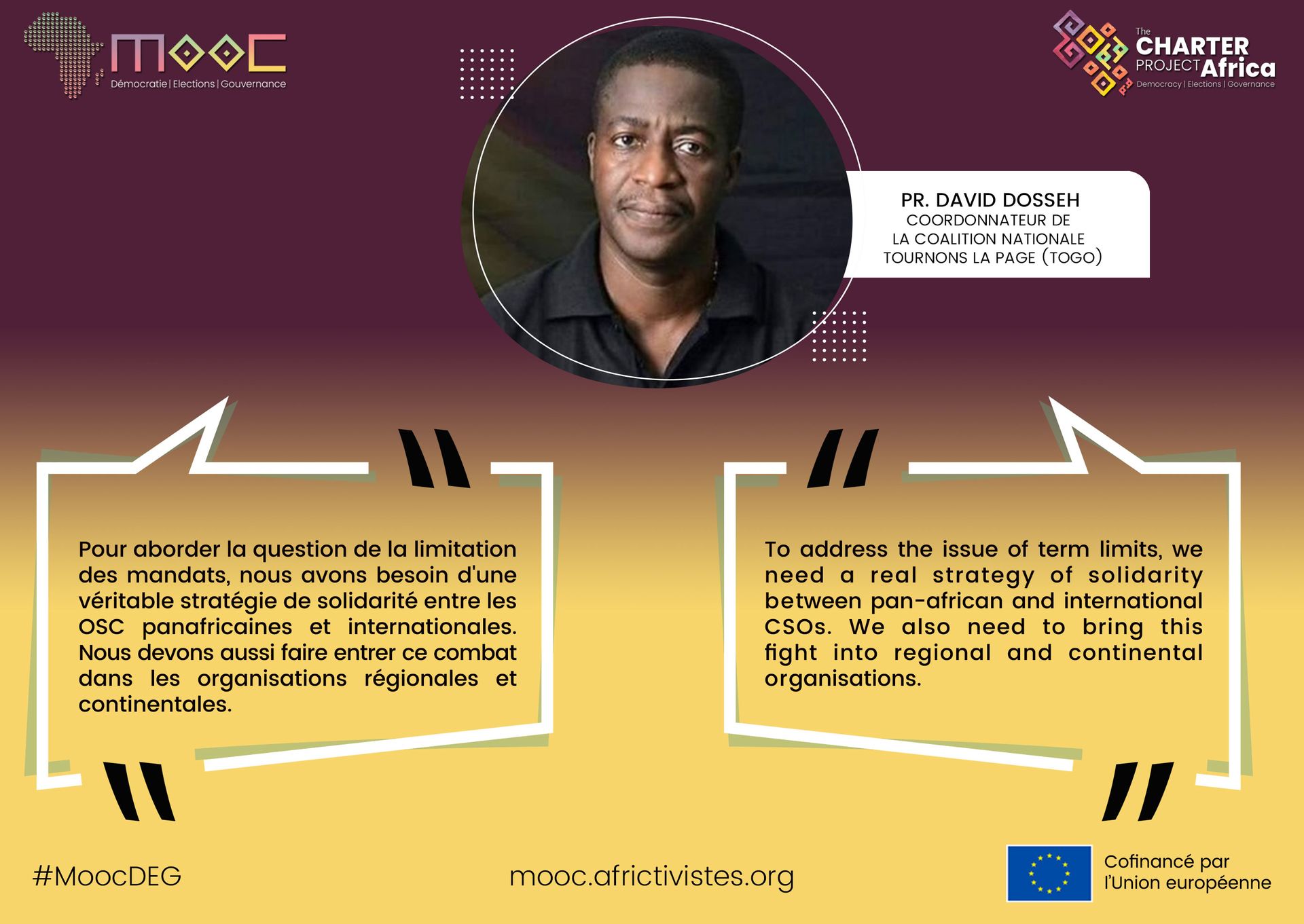
“We need a united strategy to fight for term limits.”
“This webinar provides an opportunity to discuss a key issue regarding the strengthening of democracy in Africa, namely the issue of term limits. Indeed, we can ask ourselves why today in Africa, term limits rhyme with consolidation of democracy. I believe that the answer is simple. First of all, we have to remind ourselves of the context of the last few years, which have been marked essentially by new strategies for capturing political power. Political regimes have found a way to retain power beyond the limits prescribed by the constitutions. And one realizes that regional institutions such as ECOWAS and continental institutions such as the AU are unable to adequately address this issue. (…)
What is most distressing is that these new strategies for retaining and capturing political power lead to conflict. The National Democratic Institute (NDI) has done excellent work in this regard to demonstrate that, apart from territorial disputes, major conflicts in Africa are linked to these strategies for capturing political power. And these are constitutional changes. A comma is changed in the constitution, it is then said that it is a new constitution and therefore a new Republic. It resets the counters to consider the third mandate as the first of the new Republic. (…)
Another tactic consists in creating a new constitution that is well suited to a person. This was the case in Togo in 2005. The current president came to power through a military coup. When his father died, the constitution had very specific provisions. It required that the President of the National Assembly should assume the role of interim President until the next elections. But the military went on television to hand over power to him. Then there were several constitutional fiddles. Several provisions of the Constitution were changed in a matter of 24 hours. Many provisions were changed to allow this new constitution, which is being implemented now, to allow the young president who benefited from the coup to enjoy constitutional legitimacy for his power.
When we understand that these different strategies put in place do not manage to find appropriate answers, but rather that they are responsible for severe and dramatic socio-political conflicts for the populations (we have seen this in Togo, Guinea, Côte d’Ivoire, Sudan, etc.), we must then try to find a way to limit presidential mandates. We are aware that presidential term limits do not necessarily mean democracy. But in light of the context, we must tell the various heads of state and political leaders that no matter how deft they are, once they take power, they must understand that they cannot exceed a limit prescribed by the constitution. And so, this is what led us to say that this must be our battle horse.
A distinction is often made between the Francophone and Anglophone countries. There is a feeling that English-speaking countries are much further ahead with peaceful political changeovers. Generally speaking, one has the impression that English-speaking countries have for the most part passed this stage. Efforts and energies are deployed on other issues, unlike in French-speaking countries, where we see many examples of heads of state going well beyond their term limits. Among the English-speaking countries, we can name examples such as Ghana, Botswana, and Nigeria, …
However, some states within the French-speaking countries are fortunately saving face. In Senegal for example, there seems to be a hint of a third term in office, although the country remains somewhat of an oasis of democracy or peaceful political change within the French-speaking world. Alongside Senegal, we can mention Benin. Then there are the Portuguese-speaking countries, Cape Verde for instance is frankly a great model in terms of a democratic political alternation.
Now it is up to us, who are lagging, to challenge this situation and to do everything possible to ensure that alternation becomes a reality in our countries.
I live in Togo and it is part of ECOWAS, of which it is the only country that has never experienced a peaceful political changeover. It is therefore a kind of weakness and this must lead us to reflect on what we can do to change this situation. Moreover, as a civil society organization, we are alone in this difficult context. Because when regimes do everything possible to restrict civic space and ensure that there are no dissenting voices; no one comes to tell the population that what is happening is not normal. So everything is done to restrict civic space. You have little opportunity to express yourselves in order to bring the population to understand the necessity of this strategy of presidential term limits. We need a united strategy to defend term limits. We need to work with African and even international civil society organizations and establish real organizational force. In the same way that heads of state (I am not saying that they constitute a union within the institutions, but it is clear that there is solidarity among them when one finds himself in difficulties) benefit from the support of other heads of state so that their strategy to retain power can prosper in one country, in a second, and then in another, etc. This happened in Togo. President Faure had the support of President Alpha Condé. Then we saw Alpha Conde resolutely embrace a third term strategy and we witnessed where that led Guinea…”
Ms. Lidet Tadesse, Associate Director of ECDPM
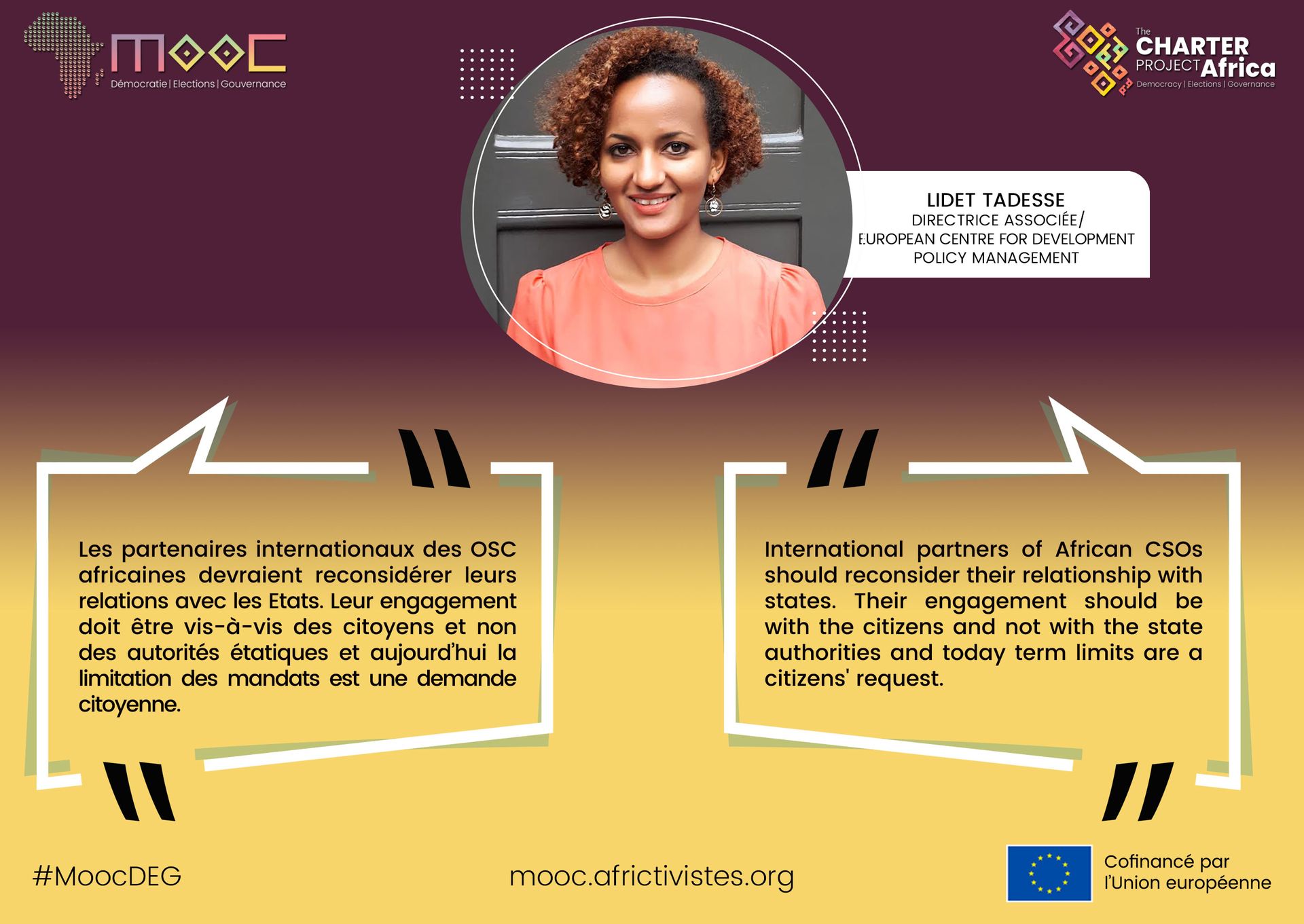
“No continental disposition on presidential term limits”
“When we talk about international actors and the role they could play, we should consider several things first.” .
First of all, it would be necessary to identify the national actors who should be involved in the issue of additional terms, whether they are the general public, civil society organizations, or legal institutions and entities. We should also mention regional and continental institutions such as ECOWAS and the AU (…) Not to mention the international partners who play a major role in these issues.
It should be noted that democratic governance is a goal to which all African countries should aspire. Several conventions of regional or continental institutions have been ratified by governments, such as the African Charter on Democracy, Elections, and Governance, which governs elections, democratic culture, and respect for democratic processes as well as good governance in AU member states. However, this convention does not establish presidential term limits.
Unfortunately, the continent does not have to this day any document or sub-regional agreement on the limitation of presidential mandates. So, at the level of the AU and regional organizations, there is of course an agreement on democratic principles and if we look at the African Governance Architecture (AGA) and the context in which it was implemented, it was to see how to limit terms and enforce this principle in African countries in the late 1990s. Unfortunately, member states had not ratified this clause. Several member states did not agree to have term limits at the continental level.
However, still at the continental level and particularly within the AU structure, the Commissioner recognizes and defends the principle. So when we are talking about democratic principles, these are implemented by continental actors and at the diplomatic level, there is pressure on national actors to defend the democratic culture (…)
Moreover, international actors who claim to have democratic values have other considerations than democratic ones. They are often commercial, security, or political considerations, as well as increasingly geopolitical considerations. (…) There are many things to take into account and the answers are not always straightforward.
It is also worth noting that when we talk about international actors, we are really talking about a very diverse group. Some of them have democratic values at heart and preserve them well and truly. We can take the example of the EU, which is not very transparent in its practices. And respect for foreign policy dictates the EU’s decision-making.
On the other hand, there are other international actors such as China, India, and Turkey, … that are very important in the world today. And these actors do not necessarily mention democratic values in their foreign policies. Very often, these treat commercial or geopolitical involvement. And they prefer not to interfere in other countries’ internal affairs. They are very explicit on this aspect and sometimes a little less so. Because taking a stance on presidential term limits is no easy task. And so, in a way, even our discussions in terms of term limits are only applicable in terms of agenda and values. (…)
In fact, national institutions such as the judiciary and the legislature should be supported. We also need to address term limits in the political dialogue. Very often, international partners could work to ensure the implementation of these clauses in order not to be accused of hypocrisy. And finally, civil society organizations’ participation should be fostered in order to ensure that States do not put pressure on these actors.
Ultimately, international actors may need to reconsider their involvement with governments that insist on violating term limits. (…)”
Mr. Alexandre Lette, Journalist, Civic Tech Project Consultant
“Civic Tech platforms offer a start to the solution, but they are not the solution on their own…”
“With the little experience I have in the field of Civic Tech over the last ten years, I don’t remember and I don’t know of a concrete initiative that once launched was able to solve the problem of term limits. But Civic Tech is the beginning of an answer because it helps to equip citizens and to better understand the democratic game. It is in this sense that I believe the use of civic technologies is essential. And by extension, the use of digital technologies is a fertile ground for the emergence of new citizen awareness.
Today, digital technology offers us a very important means of advocacy. Let’s take the example of Senegal, in 2011, there was a President who wanted to serve one too many terms. But I remember the role of a pioneering Civic Tech initiative, #Sunu2012, that had mobilized a great deal of citizen momentum in order to bring the voice of citizens who were saying no to a constitutional violation.
And this is where we realize that when digital technology is used intelligently by communities and groups of people, it can give rise to interesting projects. From this point of view, we can say that Civic Tech can be the beginning of a solution.
But this does not only consist in undertaking electoral monitoring as we are used to seeing in several countries of the continent, such as #SenegalVote, #BeninVote,… There are also other initiatives of control of governmental action, namely through the monitoring of the commitment to governmental promises, in order to allow the population to better understand the democratic game. But also to allow decision-makers to listen to citizens and to stop certain attempts to tamper with the constitution. I like to mention the “Lahidi” initiative launched by the Guinean bloggers association in a rather particular context because the platform did not prevent Alpha Conde from running for a third term.
So we have to agree that Civic Tech platforms bring the start to a solution but they are not the whole solution. The solution lies in educating people about civic responsibility.
It also lies in the fact that we present the debate in clear terms. As a young African, I am not into the fetishism of numbers. The problem lies in our leaders’ failure to keep their word and their habit of releasing the locks at the end of their term in order to ensure that they serve one more term.
Civic Tech allows for greater awareness of another form of citizenship practice, helping to better grasp this issue.”
Mr. Aubin Kpoviessi, Head of the ICT Division at the Avrankou Town Hall in Benin
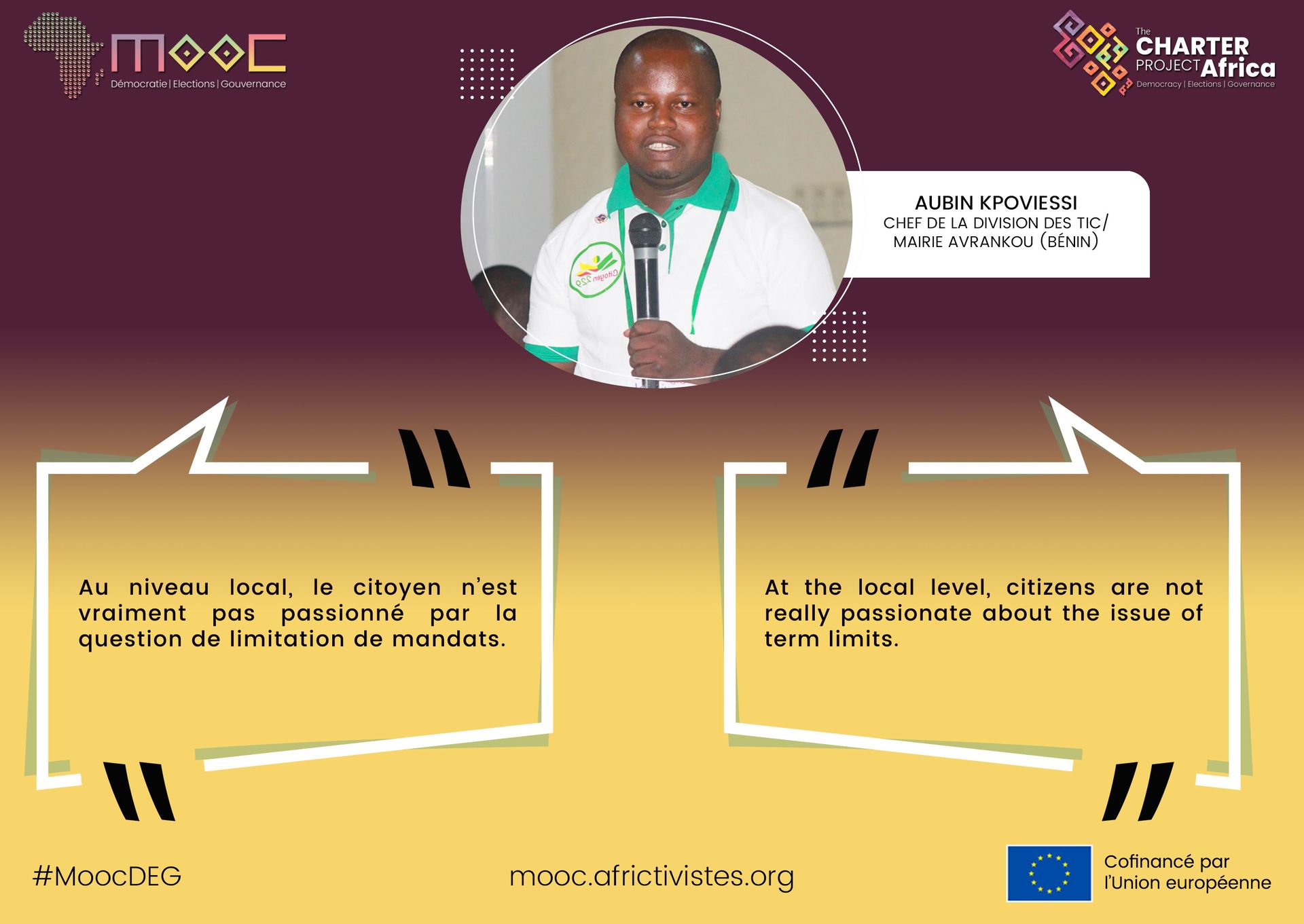
“The issue of term limits doesn’t stir much passion at the local level.”
” The issue is a bit profound in Benin. Because until now no President has ever spoken out to say that he will serve a third term. But at the end of each term, we have had suspicions. When Kerekou finished his second term in 2006, there had already been calls for a third term in 2005. To the extent that the movement “Ne touche pas à ma constitution” (Hands off my Constitution) led by Reckya Madougou (Beninese opponent) had been very successful. The same situation occurred with Boni Yayi.
When the current President Patrice Talon wanted to have a second term, he revised the article that limited the number of terms not in such a way as to have a third term in the future but instead to restrict it. Henceforth the constitution stipulates that no one can serve more than two terms. But before, there was a void. You had the possibility of doing a term of office, going to rest, and coming back to do a second term. Now with the 2019 constitutional revision, no president can serve more than two terms.
It is the same at the local level, MPs cannot serve more than 3 terms. Previously, they were elected for 4-year terms, renewable for life. However, with respect to local elected officials, a limit is not set. So the issue is settled at the national level because even the MP who is elected in a locality is first and foremost an MP of the people.
At the local level, citizens are not really passionate about the issue of term limits. As long as they have their daily bread and are at peace, their problem is solved. Even when they do rise on this issue, it is often because it has been instrumentalized by the opponents of the incumbent locally-elected officials.
Now when there are conflicts that arise and people complain about a president serving too many terms, it can start to interest people at the local level. Otherwise, this issue doesn’t galvanize so much.”
This first webinar, rich in exchanges, lessons learned, and recommendations, was attended by about 50 people from civil society organizations, the media, netizens, and web activists. It should be noted that a significant number of participants were enrolled in the MOOC “Democracy, Elections and Governance.”
We look forward to seeing you on August 12, 2022, for a new “DEG MOOC Friday” focusing on Civic Tech and Citizen Participation.
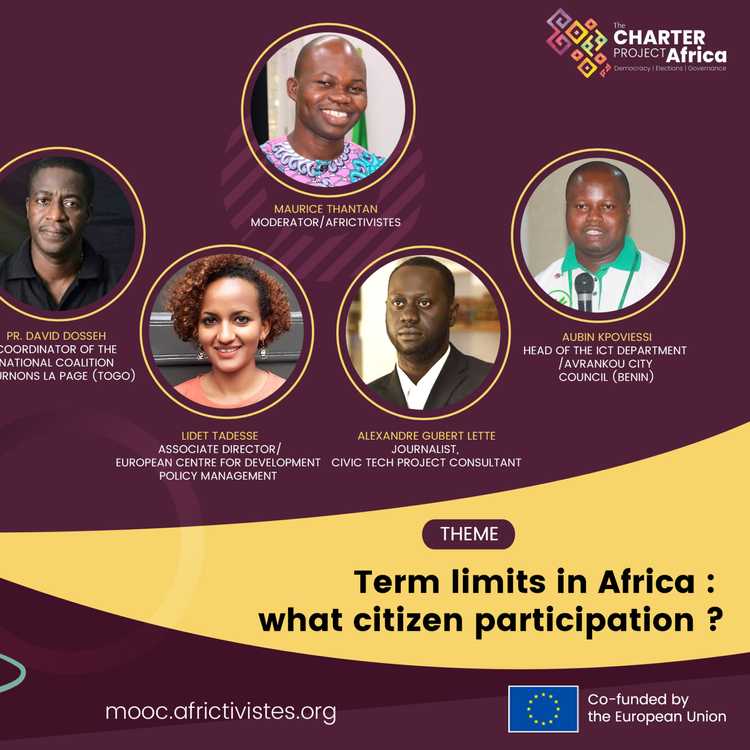
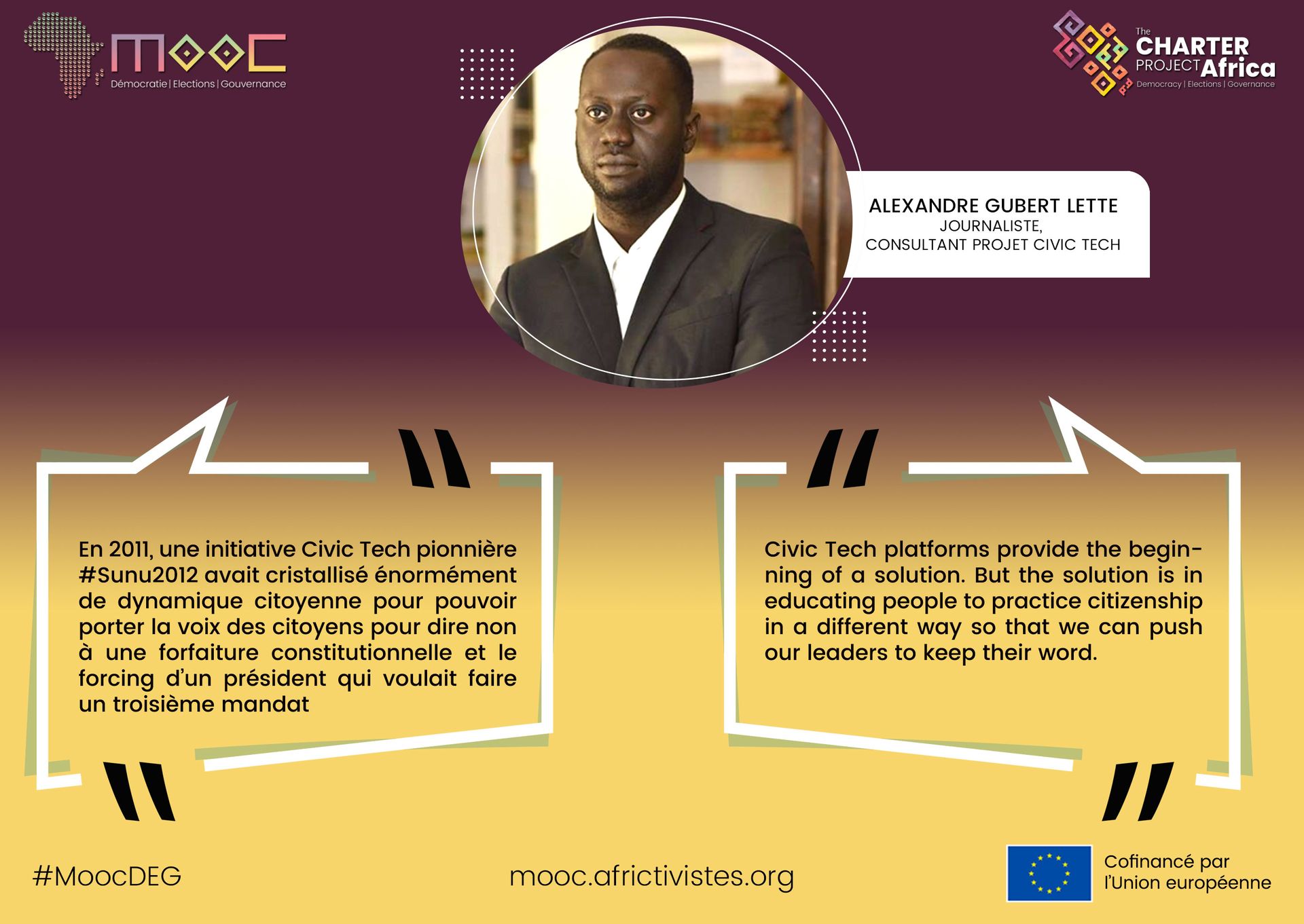

![[Mali] AfricTivistes calls on the junta to respect fundamental rights!](/static/bd7efaf062b64313cb28d63c1830b96a/9e635/WhatsApp-Image-2024-04-17-at-13.58.19.jpg)


![[Congo]Africtivistes demands the immediate and unconditional release of all activists](/static/503b1823ba8a254ad4ebd649fcf7d38c/fce2a/aliousane.png)

![[Senegal] AfricTivistes and five other organisations demand light be shed on assaullt of journalist Maimouna Ndour Faye](/static/15e44ab239406e91d8f4a5d451f5d71c/9e635/WhatsApp-Image-2024-03-02-at-14.41.24-2.jpg)



![[Senegal] AfricTivistes, two Senegalese journalists petition the ECOWAS Court over repeated mobile Internet data cuts](/static/a46ec338b20b38a189c8e35f96d090a1/fce2a/coupure-dinternet.png.png)
![[Sénégal] AfricTivistes stands against declining democracy in Senegal!](/static/6abab4867f4b682edc9f916ff3bbeb49/9e635/Restriction-internet-.jpg)



